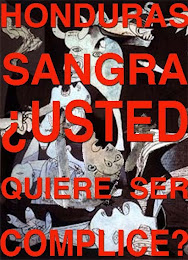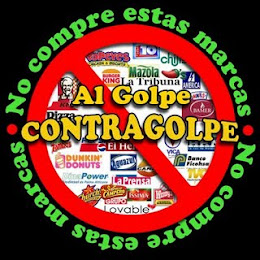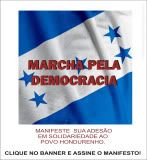Militantes assassinados em Honduras
5/1/2010, Joseph Shansky, Counterpunch – http://www.counterpunch.org/
TRADUCAO FEITA POR CAIA FITTIPALDI - Distribuido pela REDE CASTOR PHOTO
Há pilhas de cadáveres de ativistas em Honduras. A mídia está calada, em Honduras e em todo o mundo, enquanto crescem as redes de amigos e conhecidos que se unem pelo boca a boca, com notícias de mais uma morte, e são muitas, de compañeros e compañeras.
O mundo foi ‘informado’ pelo jornalismo dominante das grandes cadeias comerciais, como o New York Times, de que houve eleições “limpas e justas” dia 29 de novembro (eleições e noticiário orquestrados pela junta de golpistas apoiados pelos EUA atualmente no poder), mas a violência só fez aumentar, mais rápida do que temida.
Os alvos específicos da matança têm sido os que o establishment golpista vê como maiores ameaças ao golpe. Os mais ousados e, claro, os mais vulneráveis: membros da Resistência Popular contra o Golpe. Seus amigos. As famílias. Todos quantos oferecem comida e abrigo à Resistência. Professores, alunos, cidadãos comuns que apenas veem a falácia de haver regime não eleito no governo do país. Todos os associados à Resistência têm enfrentado violência crescente contra a coragem de protestar contra o golpe.
Depois que a comunidade internacional recebeu luz verde dos EUA – porque a ordem democrática teria sido restaurada via eleições –, foi aberta a temporada de caça, para as mais violentas forças que há em Honduras, e que trabalham para romper, a qualquer preço, a unidade da Frente de Resistência contra o golpe. Os assassinatos estão acontecendo em velocidade maior do que se pode registrar.
No domingo, 7/12, um grupo de pessoas foi metralhado quando andava por uma rua de Villanueva, arredores de Tegucigalpa. Segundo testemunhas, uma van sem placas parou em frente ao grupo, quatro mascarados saltaram da van e obrigaram o grupo a deitar-se no chão. Ali foram fuzilados. As cinco vítimas são:
· Marcos Vinicio Matute Acosta, 39
· Kennet Josué Ramírez Rosa, 23
· Gabriel Antonio Parrales Zelaya, 34
· Roger Andrés Reyes Aguilar, 22
· Isaac Enrique Soto Coello, 24
Uma mulher, Wendy Molina, 32, recebeu vários tiros e fingiu-se de morta quando os assassinos a puxaram pelos cabelos para verificar se sobrevivera. Foi hospitalizada e sobreviveu.
El Libertador, jornal hondurenho independente noticiou que todos os mortos eram militantes da sociedade civil e trabalhavam contra o golpe. Segundo outro militante do mesmo grupo na região, “Os rapazes organizaram comitês, para que os vizinhos pudessem trabalhar também pela Frente de Resistência.”
Essa matança foi um dos eventos de uma série de assassinatos de membros da Resistência, só nas últimas semanas. Dia 3/12, Walter Trochez, 25, ativista conhecido na comunidade de lésbicas, gays, bissexuais e transgêneros (LGBT) foi puxado da calçada e jogado numa vai, também por quatro mascarados, no centro de Tegucigalpa. Em depoimento que depois prestou às autoridades locais e nacionais, Walter contou que foi interrogado durante horas, por mascarados que queriam informações sobre membros e atividades da Resistência; que foi espancado com um revólver, por recusar-se a falar. Disseram-lhe que seria assassinado, falasse ou não. Trochez conseguiu escapar, abrindo a porta da van e jogando-se na rua, de onde conseguiu correr.
Não foi a primeira vez que Walter recebeu esse tipo de ameaças. É militante conhecido e respeitado contra o golpe, e há meses trabalhava documentando casos de violações de direitos humanos, sobretudo na comunidade gay. Walter acaba de publicar dois artigos. Um, imediatamente depois das eleições, intitulado “O Absenteísmo venceu” – sobre o bem-sucedido trabalho da Resistência, encorajando os cidadãos a não votarem e protestarem contra as eleições. E outro, cujo título fala por si: “Escalada dos Crimes de Ódio e Homofobia contra a comunidade de LGBTT: ação do golpe de Estado civil-religioso-militar em Honduras”.
Nos dois artigos, a mesma conclusão: “Como revolucionário, sempre estarei na linha de frente com meu povo, hoje, amanhã, sempre, mesmo sabendo que isso pode custar-me a vida.”
Dia 13/12, uma semana depois, Walter foi baleado no peito, quando caminhava para casa, por pistoleiro que passou num carro. Morreu a caminho do hospital.
Dia 5/12, Santos Garcia Corrales, membro ativo da Frente Nacional de Resistência foi preso por forças de segurança, em New Colony Capital, sul de Tegucigalpa. Foi torturado para que desse informações sobre um comerciante que fornecia alimentos e suprimentos a militantes clandestinos da Resistência. Foi solto e relatou o incidente às autoridades locais. Seu corpo foi encontrado dia 10/12, decapitado.
Tem havido muitos assassinatos na comunidade de LGBT, depois do golpe. Vários travestis têm aparecido mortos. Entidades de Direitos Humanos relatam que “mais de 18 gays e transgêneros foram assassinados em todo o país – número equivalente ao de casos registrados nos cinco anos anteriores –, nos seis meses que dura a crise política.”
A última vítima, Carlos Turcios, foi arrancado de casa em Choloma Cortes, às 3h da tarde do dia 16/12. Seu cadáver foi encontrado dia seguinte, decapitado e sem mãos. Carlos era vice-presidente da seção de Choloma da Frente de Resistência, cidade localizada a poucas hora de distância da capital. Andres Pavón, presidente do Comitê de Defesa dos Direitos Humanos em Honduras, CODEH, comenta: “Achamos que esses crimes horrendos devem ser somados a outros nos quais os cadáveres também mostram sinais brutais de tortura. Todos esses atos visam a construir o medo coletivo.”
Trata-se de esforço sinistro para enfraquecer uma comunidade que, de fato, dá sinais de estar mais forte que nunca. Como Walter Trochez escreveu (e a CNN confirmou), a maioria dos eleitores recusou-se a comparecer às juntas eleitorais, para a ‘eleição’ organizada pelos golpistas. Inúmeros governos em todo o mundo – inclusive vários governos sul-americanos, recusaram-se a reconhecer como legítimos os resultados daquela eleição.
Nesse clima de feroz repressão, os cidadãos já não podem contar com as autoridades para prover sua segurança mínima; os que são ameaçados não podem recorrer à polícia. As queixas, registradas e assinadas, como aconteceu com Santos e Walter, convertem-se em sentenças de morte. Muitos suspeitam, com boas razões, que os assassinatos sejam cometidos por policiais ou soldados. No mínimo, são acobertados pelo Estado e são fruto da atual realidade em Honduras, quando dia a dia deterioram-se os serviços de proteção que o Estado deve ao cidadão.
Pavón e outros ativistas dos Direitos Humanos em Honduras têm-se manifestado na denúncia repetida dessas atrocidades, mas os crimes ainda não parecem ter sido incluídos na pauta da grande mídia, nem em Honduras nem fora de lá. Quanto mais os cidadãos precisam dos jornais e das televisões para denunciar os abusos de que são vítimas, mais os jornais e televisões os abandonam à proópria sorte, para que se defendam sozinhos.
Como é possível que tudo isso esteja acontecendo no século 21? Por que se matam pessoas pelas ruas de Honduras, apenas porque insistem em não se calar contra um golpe civil-militar-religioso igual a tantos que a consciência democrática de todo o mundo já aprendeu a denunciar?
De todas, as mãos mais sujas de sangue são as de Roberto Micheletti e dos demais chefes do regime golpista. Mas o presidente Barack Obama e o Departamento de Estado dos EUA tiveram papel importante no processo que levou as coisas ao ponto em que estão. O governo dos EUA não tomou nenhuma medida concreta contra as milhares de violações da lei e da Constituição, todas fartamente documentadas, que ocorreram desde 28/6, data do golpe. Não surpreende que, sem ser contida por qualquer tipo de lei, a violência tenha avançado sem limite e sem controle, aos olhos do mundo.
Em recente entrevista, Francisco Rios, da Frente Nacional Contra o Golpe repetiu comunicados divulgados pela Frente, nos quais dizia que a Resistência, por mais que no momento enfrente dificuldades duríssimas, prepara massivo esforço de organização para esse novo ano. Rios informou que os militantes pararam de reunir-se publicamente, por medida necessária de segurança, mas que se dividirão em células domésticas, casa a casa, por todo o país, com planos para reemergir como força política nacional, mais forte e mais bem organizada. Walter, Santos, Carlos e todos os combatentes da Resistência em Honduras, que deram a vida por um sonho de democracia, inspiram, hoje ainda mais que antes, os companheiros. A luta continua. Honduras vive!
Joseph Shansky é jornalista. Estava em Honduras durante o golpe militar. Outros artigos do autor sobre o golpe em Honduras podem ser encontrados em: http://j-shansky.net
Recebe e-mails em fallow3@gmail.com.
Esse artigo foi publicado também em Upside Down World
O artigo original, em inglês, pode ser lido em:
http://www.counterpunch.org/shansky01052010.html
January 5, 2010
Left to Fend for Themselves
Killing Organizers in Honduras
By JOSEPH SHANSKY
The bodies of slain activists are piling up in Honduras. While it's being kept quiet in most Honduran and international media, the rage is building among a dedicated network of friends spreading the word quickly with the tragic announcement of each compañero/a.
Now that the world heard from mainstream news outlets such as the New York Times of a “clean and fair” election on Nov. 29 (orchestrated by the US-supported junta currently in power), the violence has increased even faster than feared.
The specific targets of these killings have been those perceived as the biggest threats to the coup establishment. The bravest, and thus the most vulnerable: Members of the Popular Resistance against the coup. Their friends and family. People who provide the Resistance with food and shelter. Teachers, students, and ordinary citizens who simply recognize the fallacy of an un-elected regime taking over their country. All associated with the Resistance have faced constant and growing repercussions for their courage in protesting the coup. With the international community given the green light by the US that democratic order has returned via elections, it’s open season for violent forces in Honduras working to tear apart the political unity of the Resistance Front against the coup.
The killings are happening almost faster than they can be recorded.
On Sunday, Dec. 7, a group of six people were gunned down while walking down the street in the Villanueva neighborhood of Tegucigalpa. According to sources, a white van with no license plates stopped in front of the group. Four masked men jumped out of the van and forced the group to get on the ground, where they were shot. The five victims who were killed were:
· Marcos Vinicio Matute Acosta, 39
· Kennet Josué Ramírez Rosa, 23
· Gabriel Antonio Parrales Zelaya, 34
· Roger Andrés Reyes Aguilar, 22
· Isaac Enrique Soto Coello, 24
One woman, Wendy Molina, 32, was shot several times and played dead when one of the assassins pulled her hair, checking to see if anyone in the group was still alive. She was taken to the hospital and survived.
The Honduran independent newspaper El Libertador reports that the group members were all organizers against the coup. According to a resident in the area, "The boys had organized committees so that the neighbors could get involved in the Resistance Front."
This massacre was part of a string of Resistance-related murders during the past few weeks alone. On December 3, Walter Trochez, 25 a well-known activist in the lesbian, gay, bisexual, and transgender (LGBT) community was snatched off the street and thrown into a van, again by four masked men, in downtown Tegucigalpa. In the report that he later filed to local and national authorities, Walter said he was interrogated for hours for information on Resistance members and activities, and was beaten in the face with a pistol for refusing to speak. He was told that he would be killed regardless, and he eventually escaped by throwing open the van door, falling into the street, and running away.
It wasn't the first time Walter had been subject to these kinds of threats. He was a much-loved organizer against the coup who had been documenting human rights violations, particularly in the gay community. Walter had just published two articles. One following the elections was titled "The Triumph of Abstentionism", on the success of the effort by the Resistance to encourage citizens to refuse to vote. The other was called “Escalation of Hate and Homophobic Crimes against the LGBTT Community Rooted in the Civil-Religious-Military Coup d'état in Honduras”.
In both, he concludes: "As a revolutionary I will be today, tomorrow and forever on the front lines of my people, all the while knowing that I may lose my life".
On Dec. 13, one week later, Walter was shot in the chest by a drive-by gunman while walking home. He died at the hospital.
On Dec. 5, Santos Garcia Corrales, an active member of the National Resistance Front, was detained by security forces in New Colony Capital, south of Tegucigalpa. He was then tortured for information on a local merchant who was providing food and supplies to the Resistance. After reporting the incident to local authorities, Santos’ body was found five days later on Dec 10, decapitated.
There have been others as well, notably a rise in murders in the LGBT community since the coup. In particular, several transvestites have been recently killed in similarly gruesome ways. Human rights advocates report that “up to 18 gay and transgender men have been killed nationwide — as many as the five prior years — in the nearly six months since a political crisis rocked the nation.”
The latest victim, Carlos Turcios, was kidnapped outside his home in Choloma Cortes, at three in the afternoon of Wednesday Dec. 16. He was found dead the next day, with his hands and head cut off. Carlos had been vice-president of the Choloma chapter of the Resistance Front, a town located a few hours outside of the capital. Andres Pavón, president of CODEH (Committee for the Defense of Human Rights in Honduras), commented: "We believe this horrendous crime joins others where the bodies show signs of brutal torture…This aggression is directed to the construction of collective fear.”
It is a sinister effort to shake up a community that is now in fact stronger than ever. As Walter Trochez noted (and CNN confirmed), most of the country refused to go to the polls that day. Many of the world’s governments, including most of Latin America, refused to recognize the results.
In this climate of fierce repression, citizens can no longer depend on authorities for the most basic protective rights, and those fearful for their lives cannot report to the police. Complaints they file, such as those of Santos and Walter, could soon become signatures to their own death letters. Many believe with good reason that the killings are state-sponsored. At the very least, they are the result of new conditions which allow for the widespread deterioration of state protection.
Pavón and other human rights leaders in Honduras have been extremely vocal in denouncing these atrocities, but the story has remained under the radar for most Hondurans and almost all international media. At the time when Hondurans most need exposure to these abuses, they’ve been left to fend for themselves.
How did this happen? Why are people being randomly executed in dark corners of the country for simply standing in opposition to a military coup?
Most of the bloodshed is on the hands of coup president Roberto Micheletti and other leaders of the regime. However, President Barack Obama and the US State Department played a major role in allowing conditions to get to this point. The US government took no concrete action against the thousands of documented violations since the coup took place June 28. It’s no shock that the violence has worsened dramatically with the eyes of the world now averted.
In a recent interview, Francisco Rios of the National Front Against the Coup reiterated Frente communiqués which stated that the Resistance, though now lying low, is preparing a massive organization effort for next year and beyond. Rios reported that they have stopped meeting publicly as a safety measure for now, but will soon begin dividing into chapters around the country with plans to emerge as a new, strengthened political force. Walter, Santos, Carlos, and all of the Resistance fighters who gave their lives have inspired others in the movement to continue the struggle for justice in Honduras.
Joseph Shansky was reporting from Honduras during the recent military coup, and can be reached at fallow3@gmail.com. More articles on the coup in Honduras are available at http://j-shansky.net
This article also appears in Upside Down World.
http://www.counterpunch.org/shansky01052010.html

















Nenhum comentário:
Postar um comentário